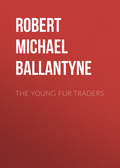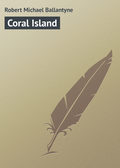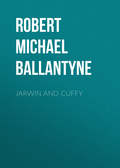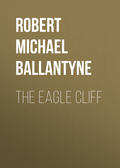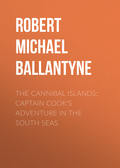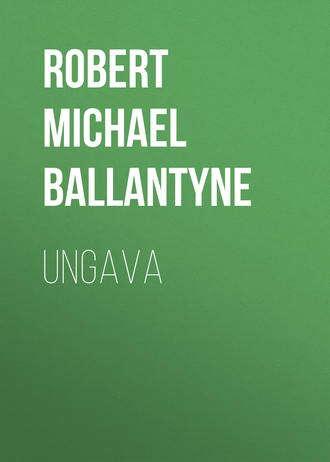
Robert Michael Ballantyne
Ungava
Chapter Twenty Two.
Maximus—Deer spearing—A surprisingly bad shot—Character of the natives
“Hallo! what have we here?” exclaimed Stanley, starting from his seat in amazement, as the giant entered the hall of Fort Chimo—his left hand grasping a blood-stained wolf by the throat, and Edith resting in his right arm.
At first the startled father imagined his child must have been wounded, if not killed, by the savage animal; but his mind was immediately relieved on this point by Edith herself, who was no sooner laid on her bed than she recovered sufficiently to narrate the circumstances attending her fall.
“Well, Maximus,” said Stanley, returning to the hall and applying to the bulky savage the term that seemed most appropriate to him, “shake hands with me, my good fellow. You’ve saved Chimo’s life, it seems; and that’s a good turn I’ll not forget. But a—. I see you don’t understand a word I say. Hallo! Moses, Moses! you deaf rascal, come here!” he shouted, as that worthy passed the window.
“Yis, mossue,” said Moses, entering the hall. “Oh, me! what a walrus am dis! Me do b’lieve him most high as a tree an’ more broader nor iveryt’ing!”
“Hold thy tongue, Moses, and ask the fellow where he came from; but tell him first that I’m obliged to him for saving Chimo from that villainous wolf.”
While Moses interpreted, Arnalooa and Okatook, being privileged members of the tribe, crossed over to Edith’s room.
“Well, what says he?” inquired Stanley, at the end of a long address which the giant had delivered to Moses.
“Him say he heered we have come to trade, from Eskeemo to west’ard, and so him come for to see us.”
“A most excellent reason,” said Stanley. “Has he brought any furs?”
“Yis; him brought one two fox, and two t’ree deer. No have much furs in dis country, him say.”
“Sorry to hear that. Perhaps his opinion may change when he sees the inside of our store. But I would like him to stay about the fort as a hunter, Moses; he seems a first-rate man. Ask him if he will consent to stay for a time.”
“P’raps he fuss-rate, p’raps not,” muttered Moses in a disparaging tone, as he turned to put the question.
“Him say yis.”
“Very good; then take him to your house, Moses, and give him some food and a pipe, and teach him English as fast as you can, and see that it is grammatical. D’ye hear?”
“Yis, mossue, me quite sure for to teach him dat.”
As Moses turned to quit the hall, Stanley called him back. “Ask Maximus, by-the-bye, if he knows anything of a party of Esquimaux who seem to have been attacked, not long ago, by Indians in this neighbourhood.”
No sooner was this question put than the face of Maximus, which had worn a placid, smiling expression during the foregoing conversation, totally changed. His brows lowered, and his lips were tightly compressed, as he regarded Stanley for a few moments ere he ventured to reply. Then, in a deep, earnest tone, he related the attack, the slaughter of his people, their subsequent escape, and the loss of his bride. Even Moses was agitated as he went on, and showed his teeth like an enraged mastiff when the Esquimau came to speak of his irreparable loss.
“Stay one moment,” said Stanley, when Maximus concluded. “I have something to show you;” and hastening into his room, he quickly returned with the little piece of sealskin that had been found at the deserted Indian camp. “Do you know anything of this, Maximus? Do you understand these marks?”
The Esquimau uttered a cry of surprise when his eye fell on the piece of skin, and he seemed much agitated while he put several quick, earnest questions to Moses, who replied as earnestly and quickly; then turning rapidly on his heel, he sprang through the doorway, and was soon lost to view in the stunted woods of the ravine above the fort.
“That fellow seems in a hurry,” exclaimed Frank Morton, entering the room just as the savage made his exit. “Who is he, and wherefore in so great haste?”
“As to who he is,” answered Stanley, “I’ll tell you that after Moses has explained the cause of his sudden flight.”
“He say that him’s wife make dat skin, and de arrow on him skin show dat de Injuns take her to deir tents.”
“But did you not tell him that we found the skin long ago, and that the Indians must be far, far away by this time—nobody knows where?” demanded Frank.
“Yis, me tell him. But he go for to see de spot. T’ink him find more t’ings, p’raps.”
“Oh, messieurs, voilà!” shouted La Roche, pointing towards the river, as he rushed, breathless with haste, into the hall; “les Esquimaux, dem kill all de deer dans le kontry. Oui, voilà! dans les kayak. Two dozen at vonce—vraiment!” Without waiting a reply, the excited Frenchman turned round and rushed out of the house, followed by Stanley and Frank, who seized their guns, which always hung ready loaded on the walls of the apartment.
On reaching the water’s edge, the scene that met their eye was indeed sufficient to account for the excitement of La Roche. A herd of perhaps fifty or sixty deer, on their way to the coast, and ignorant of the foes who had so recently invaded their solitudes, had descended the ravine opposite the fort, with the intention of crossing the river. The Esquimaux had perceived this, and keeping themselves and their kayaks concealed until most of the animals were in the water, and the leaders of the herd more than two-thirds over, they then gave chase, and getting between the deer and the opposite shore, cut off their retreat, and drove them towards their encampment.
Here the slaughter commenced, and Stanley and Frank arrived at the scene of action while they were in the midst of the wholesale destruction. In all directions the kayaks, with their solitary occupants, were darting about hither and thither like arrows in the midst of the affrighted animals; none of which, however, were speared until they were driven quite close to the shore. In their terror, the deer endeavoured to escape by swimming in different directions; but the long double-bladed paddles of the Esquimaux sent the light kayaks after them like lightning, and a sharp prick on their flanks turned them in the right direction. There were so many deer, however, that a few succeeded in gaining the land; but here the guns of the traders awaited them. In the midst of this wild scene, Frank’s attention was arrested by the cool proceedings of an Esquimau, whose name was Chacooto. He had several times exhibited a degree of shrewdness beyond his fellows during his residence near the fort, and was evidently a man of importance in the tribe. Chacooto had collected together a band of the herd, amounting to fifteen, and, by dint of cool decision and quick movements, had driven them to within a few yards of the shore, exactly opposite the spot whereon his tent stood. One young buck, of about two years old, darted away from the rest more than once, but, with a sweep of the paddle and a prick of the lance, Chacooto turned it back again, while a quiet sarcastic smile played on his countenance. Having driven the herd close enough in for his purpose, the Esquimau ended the career of the refractory buck with a single thrust of his lance, and then proceeded coolly to stab them all one after another.
“Och, the spalpeen!” said a voice at Frank’s ear. “’Tis himsilf knows how to do it, an’ no mistake. Musha! his lance goes out and in like a thailor’s needle; an’ he niver strikes more nor wance, the haythen!”
“He certainly does know how to do it, Bryan,” replied Frank; “and it’s a comfort to know that every thrust kills in a moment. I like to see as little of the appearance of cruelty as possible in work of this kind.”
“Arrah! there’s wan that’ll chate ’im, anyhow,” cried Bryan, throwing forward his gun in nervous haste, as one of the deer gained the land, despite Chacooto’s rapidity, and bounded towards the hills.
Frank smiled at the eager haste of his companion, who was one of the poor shots of the party, and, consequently, always in a hurry. “Now, Bryan, there’s a chance. Take your time. Just behind the shoulder; a little low, for that gun kicks horribly.”
“Murder and blazes, she won’t go off!” cried the exasperated Irishman, as, after a wavering effort to take aim, he essayed unsuccessfully to pull the trigger.
“Half-cock, man! Cock it!” said Frank quickly.
“So ’tis, be the mortial! Och, Bryan, yer too cliver, ye are!” he exclaimed, rectifying his error with a force that nearly tore off the dog-head. At that instant there was a sharp crack, and the deer, bounding into the air, fell dead on the sand at the edge of the willows.
“Forgive me, Bryan,” said Massan, chuckling and reloading his piece as he walked up to his comrade. “I would not ha’ taken’t out o’ yer teeth, lad, if ye had been ready; but one bound more would ha’ put the beast beyond the reach o’ a bullet.”
“Faix, Massan, ye desarve to be hanged for murther. Shure I was waitin’ till the poor crayture got into the bushes, to give it a chance o’ its life, before I fired. That’s the way that gintlemen from the ould country does when we’re out sportin’. We always put up the birds first, and fire afterwards; but you salvages murther a poor brute on the sand, whin it’s only two fathoms from ye. Shame on ye, Massan.”
“See, Massan,” cried Frank, pointing to another deer, which, having escaped its pursuers, had gained the heights above. “That fellow is beyond us both, I fear. Be ready when it comes into view beyond the cliff there.”
But Massan did not move; and when Frank threw forward his gun, he felt his arm arrested.
“Pardon me, monsieur,” said Massan respectfully; “there’s a sure bullet about to start for that deer.”
As he spoke, he pointed to Dick Prince, who, ignorant of the fact that the deer had been seen by Frank, was watching its reappearance from behind a neighbouring rock, at some distance from where they stood. In a second it came into view—the bullet sped—and the deer bounded lightly into the bushes, evidently unhurt!
It is difficult to say whether Dick Prince or his comrades exhibited most amazement in their looks at this result. That the crack shot of the party—the man who could hit a button in the centre at a hundred yards, and cut the head off a partridge at a hundred and fifty—should miss a deer at ninety yards, was utterly incomprehensible.
“Is it yer own gun ye’ve got?” inquired Bryan, as the discomfited marksman walked up.
“No; it’s yours,” replied Prince.
A smile, which resolved itself into a myriad of wrinkles, flitted over the blacksmith’s face as he said—
“Ah, Prince! ye’ll requare long practice to come to the parfect use o’ that wipon. I’ve always fired three yards, at laste, to the left, iver since we fell over the hill togither. If it’s a very long shot, it requares four to take the baste in the flank, or four an’ a half if ye want to hit the shoulder, besides an allowance o’ two feet above its head, to make up for the twist I gave it the other day in the forge, in tryin’ to put it right!”
This explanation was satisfactory to all parties, especially so to Prince, who felt that his credit was saved; and if Prince had a weakness at all, it was upon this point.
The deer were now all killed, with the exception of those of the band that had been last in entering the river. These, with a few stragglers, had returned to the shore from which they started. The remainder of the evening was devoted to skinning and cutting up the carcasses—an operation requiring considerable time, skill, and labour.
While the people at the fort were thus employed, Maximus (who adopted at once the name given to him by Stanley) returned from his fruitless journey to the Indian camp, and assisted the men at their work. He made no allusion whatever to his visit to the deserted Indian camp; but, from the settled expression of deep sadness that clouded his countenance, it was inferred that what he had seen there had not tended to raise his hopes.
The supply of deer obtained at this time was very seasonable, for the frost had now begun to set in so steadily that the meat could be hung up to freeze, and thus be kept fresh for winter’s consumption. Some of it, however, was dried and stored away in bales; while a small quantity was pounded after being dried, made into pemmican, and reserved for future journeys.
As for the Esquimaux, they gave themselves up, during the first night, to feasting and rejoicing. During the short time that they had been at the fort, they had converted the promontory on which they were encamped into a scene of the utmost confusion and filth. A regard for truth constrains us to say, that although these poor creatures turned out to be honest, and simple, and kind-hearted, they did not by any means turn out to be cleanly; quite the reverse.
They had erected four summer tents on the beach, which were composed of skins sewed together, and supported on poles in such a way as to afford ample room for the accommodation of their families. The entrance to each tent was through a passage, which was also made of skins, hung over a line fastened to a pole at the distance of twelve or fifteen feet from the tent. Each side of this entrance was lined with piles of provisions—seals, fish, ducks, and venison, in various stages of decay, which rendered the passage into the interior a trying operation. True, it was intended that the frost should prevent this decay; but, unfortunately, the frost did not always do its duty. The manner in which they cut up their deer and prepared them for future use was curious. After cutting the animals into two, without skinning them, they pinned up the front half with the heart and liver in the cavity. The other half they treated in a similar way, minus the heart and liver, and then put them out to freeze until required. When frozen, they were frequently used in their tents as seats, until the gradual diminution of the larder demanded that they should be appropriated to their proper use.
The tribe of Esquimaux who resided near Fort Chimo at this time were possessed of an enormous stone kettle, in which they boiled an entire deer at one time; and while the good people luxuriated on the flesh of the animal in their tents, the dogs assembled round the boiler to await the cooling of the soup—thus verifying the assertion formerly made by Massan on that head.
The dogs resembled those of the Newfoundland breed in some respects, but were scarcely so large or good-looking, and had erect instead of pendent ears. There were about a dozen of them; and it was wonderful to observe the patience with which they sat in a circle round the kettle, gazing earnestly at the soup, licking their chaps the while, in anticipation of the feast.
The successful hunt was regarded as worthy of being specially celebrated by the distribution of a glass of grog to the men, and also to the Esquimaux; for at the time we write of, the Hudson’s Bay Company had not yet instituted the wise and humane regulation which has since become a standing order throughout all parts of the country, except where there is opposition—namely, that ardent spirits shall not be given to the natives. However, Stanley’s natural disposition led him to be very circumspect in giving spirits to the men and natives, and the supply now issued was very small.
In the men it produced a desire for the violin, and created a tendency to sing and tell stories. In the Esquimaux it produced at first dislike, and afterwards wild excitement, which, in the case of Chacooto, ended in a desire to fight. But his comrades, assisted by his wives, overpowered him, tied him in a sack made of sealskin, and left him to roar and kick till he fell asleep!
The honesty of these natives was exhibited very strikingly in all their dealings with the fur-traders. Although iron tools of every description were scattered about the fort, while the men were engaged in erecting the several buildings, not one was missed; and even the useless nails and scraps of metal that were thrown away, when they were found by chance by the Esquimaux, were always brought to the house, and the question asked, “Were they of any use?” before being appropriated. They were great beggars, however; which was not surprising, considering the value of the articles possessed by the traders, and their own limited means of purchasing them. Their chief wealth at this time lay in boots and deerskins, which the women were constantly employed in preparing; but Stanley urged them to go into the interior and hunt, as, although deerskins and boots were useful, furs were infinitely more valuable. But the Esquimaux had much too lively a dread of the Indians to venture away from the coast, and seemed inclined to hang about the place in comparative idleness much longer than was desirable.
Chapter Twenty Three.
More arrivals—Honesty—Indians come upon the scene—The tribes reconciled—Disease and death change the aspect of things—Philosophic discourse
A day or two after the successful deer-hunt above related, several bands of Esquimaux arrived at Fort Chimo, and encamped beside their comrades. This unusual influx of visitors soon exhausted the venison that had been procured; but hunting parties were constantly on the alert, and as game of all kinds was plentiful, they lived in the midst of abundance. To all of these Stanley made small presents of beads and tobacco, and recommended them strongly to go and hunt for furs. But they seemed to like their quarters, and refused to move. The new arrivals, along with those who had first come, formed a band of about three hundred, and were found, almost without exception, to be a quiet, inoffensive, and honest people.
As a proof of this latter quality, we may mention a circumstance that occurred a few days after the arrival of the last band. Being desirous of taking some additional soundings, Stanley launched his boat by the help of the Esquimaux, for his own men were all absent hunting and fishing. The boat referred to had been sent to the fort in the ship, and was a most useful and acceptable gift from the Governor of the Fur Company to the gentleman in charge of Ungava. Stanley hoisted his sails, and prepared to run down the river; but ere he had advanced a hundred yards, he was startled by a burst of loud cries from the shore, and, looking back, he observed the whole band of natives pouring like a torrent into the fort! His heart leaped within him as he thought of his unprotected wife and child. Turning the boat towards the shore, he ran it on the beach, and, leaving it with all the sails standing, he rushed into the square of the fort, forcing his way through the crush of natives, whose vociferous talking rendered what they said, for a time, unintelligible. At length Moses forced his way through the crowd, followed by one of the natives, who led a large dog by a line fastened round its neck.
“What’s the matter, Moses? what’s wrong?” cried Stanley.
“Oh, not’ing at all,” replied Moses, casting a look of pity at his countrymen. “Dem are great gooses. Die man here wid de dog, him say dat de child’n was play in de square of dis fort, an’ one o’ dem trow stone and broke a window. It was de son ob dis man what do it, an’ him say he most awful sorry—an’ all de people sorry, so dey bring de dog to pay for de broken window.”
“I’m glad it’s nothing worse,” cried Stanley, much relieved. “Tell them I’m happy to find they are sorry, and I hope they will keep the children out of the square in future; but I don’t want the dog. It was an accident, and not worth making such a noise about.”
The Esquimaux, however, would not agree to look upon this accident as a light matter. They said truly, that glass was not to be got so easily as the ice-blocks with which they formed windows to their own winter houses, so they insisted on the dog being accepted; and at length Stanley gave in, but took care that the native who gave it should not be a loser in consequence of his honesty. Moreover, Stanley begged of them to send up several of their best dogs, saying that he would purchase them, as he was in want of a team for hauling the winter firewood.
Next day, while Stanley was engaged in the trading store with a party of Esquimaux, he was surprised by hearing a volley of musketry fired at the back of the fort. Snatching up a loaded gun as he ran hastily out, he found that the shots had been fired by a band of Indians as a salute to the fort on their arrival.
This was the first time that Indians had made their appearance since the arrival of the fur-traders; and their advent at the present time was most fortunate, as it afforded Stanley an opportunity of commencing his negotiations as peacemaker in the presence of a considerable band of both parties. The Indians, fifteen in number, were all clothed, with the exception of their chief, in deerskin hunting shirts, ornamented moccasins of the same material, and cloth leggings. They wore no head-dress, but their long, straight, black hair was decorated with feathers and small metallic ornaments, among which were several silver thimbles. Their powder-horns and shot-pouches were gaily ornamented with bead and quill work; and they were all armed with long guns, on which they leaned as they stood silently, in a picturesque group, on the flat, rocky platform above the spring, which has been more than once alluded to.
This platform overlooked the fort, and was a favourite promenade of the traders. At present it formed a sort of neutral ground, on which the Indians took their stand. The red men were overawed by the very superior number of the Esquimaux, and felt that they were safe only so long as they stood on the flat rock, which was the only path leading to the ravine, through which, if need be, they could easily escape into the mountains.
The chief of the Indians, unlike his fellows, was dressed in a costume of the most grotesque and brilliant character, and, certainly, one which, however much it might raise the admiration of his savage companions, did not add to his dignity in the eyes of the traders. He wore a long, bright scarlet coat, richly embroidered with gold lace, with large cuffs, and gilt buttons; a pair of blue cloth trousers, and a vest of the same material; a broad worsted sash, and a hat in the form of the ordinary beaver or silk hat of Europe. The material, however, was very coarse; but this was made up for by the silver, and gilt cords, and tassels with which it was profusely decorated. He evidently felt his own importance, and stood with a calm, dignified gaze, waiting to be addressed.
Hailing Ma-istequan, who leaned on the axe with which he had been cutting firewood when the volley of the Indians arrested him, Stanley bade him invite them to enter the fort.
“We cannot come down,” replied the chief, after Ma-istequan had given the invitation. “The Eskimos are in numbers like the stars; we are few. If the pale-faces are our friends, let them come up here and take us by the hand and bring us down.”
“Very reasonable,” said Stanley to Frank, who stood beside him; “we must take care that the Esquimaux do not take advantage of their numbers to avenge their ancient wrongs.”
Then, turning to the natives, who had now crowded in large numbers into the fort, Stanley addressed them in a serious tone; told them that the time had now come when he hoped to reconcile the Innuit and the Allat (Esquimau name for Indians) together; and that he expected they would show their gratitude for his many kindnesses to them by treating the Indians, who were his friends, with hospitality. The Esquimaux promised obedience, after which Stanley ascended to the promenade, and taking the Indian chief by the hand, led him towards the fort, followed by the whole band in single file.
It is not necessary to detail the speeches that followed on both sides on this occasion, and the eloquence that was expended that evening in the cause of peace. Suffice it to say that the Indians and Esquimaux shook hands and exchanged gifts in the presence of the assembled garrison of Fort Chimo. But although the traders had reason to congratulate themselves on having so far succeeded in the establishment of peace, they could not conceal from themselves the fact that while, on the one hand, the Esquimaux appeared to be perfectly sincere and cordial in their professions, on the other hand the Indians evinced a good deal of taciturnity at first, and even after their reserve was overcome, seemed to act as men do who are constrained to the performance of a distasteful action.
In general character, the Indians of Labrador do not contrast well with the Esquimaux—at least this may with truth be said of those who afterwards became attached to the district of Ungava. The Indian is reserved and taciturn, while the Esquimau is candid, frank, and communicative. Of course there are exceptions on both sides.
On the evening of the same day, Stanley had much difficulty in overcoming the reserve of the Indians, so as to procure information regarding the interior; and it was not until their hearts were opened by the influence of tobacco, that they condescended to give the required information. This was to the effect that there were not many fur-bearing animals in the immediate vicinity of Ungava, but that there were a good many in the wooded country lying to the southward and eastward. Here, however, the Indians do not care to hunt, preferring rather to keep to the heights of land, and near the coast, where the deer are numerous. In fact, Stanley afterwards found that the facility with which the Indians procured deer in this part of the country was a serious drawback to the fur trade, as they contented themselves with trapping just enough of otters, foxes, etcetera, to enable them to procure a supply of ammunition with which to hunt the deer.
The Indians had brought a few beaver and other furs to trade, and, after receiving a good meal and a few presents, they took up their quarters on a plot of ground close to the fort. Here they lived a short time in perfect friendship with the Esquimaux, visiting them, and hunting in company; but more than once they exhibited their natural disposition by stealing the goods of their neighbours. On one occasion, two Esquimau children were missed from the camp, and in the course of the day they returned to their parents clothed in Indian costume! This was a very polite piece of attention on the part of the Indians, but the effect of it was much marred, the same day, by the abstraction of a knife from an Esquimau tent. Stanley insisted on the article being restored, and severely reprimanded the offender. But, although the general harmony of the camp was sometimes broken by such events, the friendship between the two parties seemed to be gradually increasing, and Stanley saw with satisfaction that the Allat and the Innuit bade fair to become fast friends for the future.
But an event occurred at this time which put an end to their intercourse, and very much altered the aspect of affairs. For some time past the men at the fort had been subject to rather severe attacks of cold, or a species of influenza. This they unfortunately communicated to the Esquimaux, who seemed to be peculiarly susceptible of the disease. Being very fat and full-blooded, it had the most dreadful effect on the poor creatures, and at a certain stage almost choked them. At last one night it was reported that ten of their number had died from absolute suffocation. All of these had been strong and robust, and they died after two days’ illness.
One of those who were attacked was Edith’s little friend, Arnalooa, and just before the ten Esquimaux died, Edith had gone down to the camp with a present of beads to console her. She found her much better, and, after talking to her for some time, she took her leave, promising to pay her another visit next day. True to her promise, Edith sallied forth after breakfast with a little native basket on her arm. About half an hour afterwards, while Stanley was sitting in the hall with his wife and Frank, they were startled by the sudden appearance of Edith, out of breath from the speed with which she had run home, and her face overspread with a deadly paleness.
“What is the matter, my darling?” cried her mother, starting up in alarm.
“Oh! the Esquimaux are lying dead on the sand,” gasped Edith, as she laid her head on her mother’s breast, “and the rest are all gone.”
Without waiting to hear more, Frank and Stanley took down their guns and hastened to the camp. Here a scene of the most horrible kind presented itself. The whole camp exhibited evidences of a hasty flight, and eight of the people who had died during the night were lying exposed on the rocks, with their white faces and ghastly eyeballs turned towards the sky. The other two had been buried on the rocks under a heap of stones, which did not conceal them entirely from view.
“No wonder poor Edith was alarmed,” said Stanley sadly, as he leaned on his fowling-piece and surveyed the scene of desolation and death.
“I have been told,” remarked Frank, “that the Esquimaux have a superstitious dread of this river. Oolibuck mentioned to me this morning that he has had a good deal of conversation with the natives about this disease, and they told him that it invariably attacks them when they enter this river, and carries them off by dozens; so that they never come into it except when they require wood, and always stay as short a time as possible.”
“Ah! that’s bad,” said Stanley; “I fear that it will go much against the success of the establishment. But we must hope better things; and, truly, with this exception, all has gone well hitherto. Said they anything more, Frank?”
“Yes; they hinted, it seems, their intention of flying away from this fatal spot, and taking up their abode for the winter at the mouth of False River, where they can obtain a livelihood by seal-fishing; but Oolibuck thought they did not mean to put the threat in execution, and did not imagine that they were in such alarm that they would go off without burying their dead.”
“We must do that for them, Frank,” said Stanley, turning to retrace his steps to the fort; “send down as many of the men as you can spare to-day, and get it done at once.”



